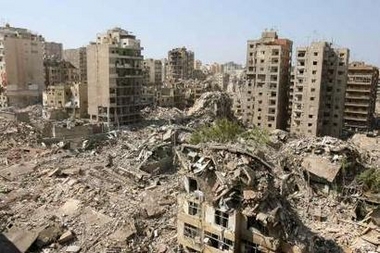 By Roula Khalaf in Beirut and Mark Turner at the United Nations, Published: August 27 2006 18:33 | Last updated: August 27 2006 18:33, The Lebanese government will on Monday press Kofi Annan, UN secretary-general, for a lifting of the Israeli air and sea blockade and appeal for international help to persuade Israel to withdraw from a disputed border area.Mr Annan arrives in Beirut on the first leg of a high-stakes Middle East tour in which he will face a dizzying array of conflicting agendas and entrenched demands.
By Roula Khalaf in Beirut and Mark Turner at the United Nations, Published: August 27 2006 18:33 | Last updated: August 27 2006 18:33, The Lebanese government will on Monday press Kofi Annan, UN secretary-general, for a lifting of the Israeli air and sea blockade and appeal for international help to persuade Israel to withdraw from a disputed border area.Mr Annan arrives in Beirut on the first leg of a high-stakes Middle East tour in which he will face a dizzying array of conflicting agendas and entrenched demands.
Bringing all the parties with interests in Lebanon around a common goal will prove a struggle. His hope of also reinvigorating the broader Arab-Israeli peace process could prove one of the toughest challenges of his chequered career. The trip, which includes Israel, leading Arab states, as well as stops in Syria and Iran, comes ahead of his report to the Security Council on the implementation of the two-week-old UN ceasefire resolution that ended the fighting between Israel and Lebanon
Mr Annan’s task was made slightly easier by progress on the international force, with European governments on Friday pledging up to 7,000 troops for an expanded peacekeeping operation in southern Lebanon, which should allow for the withdrawal of Israeli troops.
But officials in Beirut said Israel’s continued blockade of the airport and ports was reinforcing an atmosphere of instability and undercutting a government that has to negotiate every step of the ceasefire resolution with Hizbollah.
Mr Annan’s talks in Beirut are likely to cover the government’s compromise with Hizbollah over the southern demilitarised zone, where the militant group has agreed to conceal its weapons but not to disarm.
Lebanese officials said a crucial Lebanese wish is an Israeli withdrawal from the Shebaa Farms, a border strip that Israel says belongs to Syria, not Lebanon. But Mr Annan will face stiff opposition to a withdrawal from an Israeli government that insists leaving Shebaa would reward Hizbollah.
But officials in Beirut argue regaining control over Shebaa would remove a key justification for the existence of Hizbollah’s military wing and bolster government efforts to gradually absorb the group into the Lebanese army.
Mr Annan’s stops in Damascus and Tehran, Hizbollah’s two outside backers, underline his recognition that stability in Lebanon requires their co-operation.
But in both capitals he is likely to hear denials of involvement in weapons supplies to Hizbollah. In Syria, he will also hear appeals for a resumption of Syrian-Israeli peace talks amid hopes in Damascus that the Lebanon conflict will help it regain the Golan Heights, occupied by Israel in the 1967 Middle East war.
Additional reporting by Gareth Smyth in Tehran



